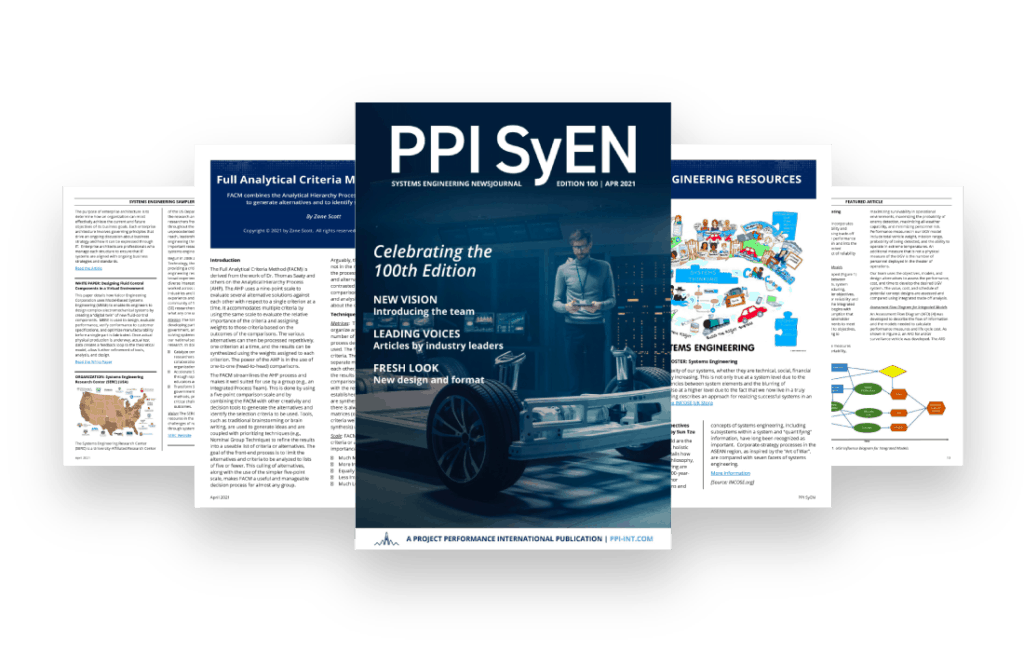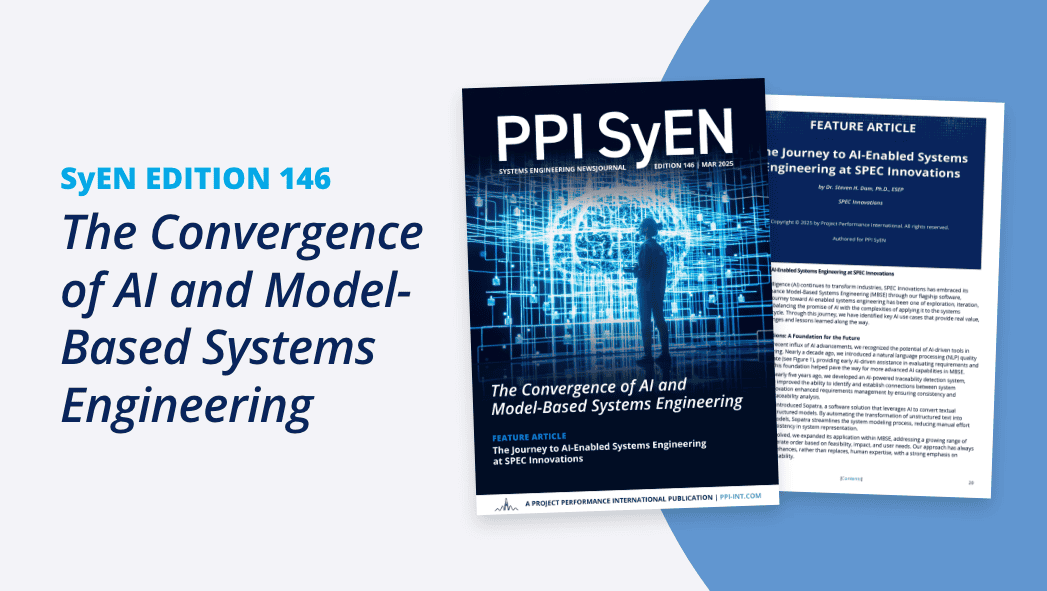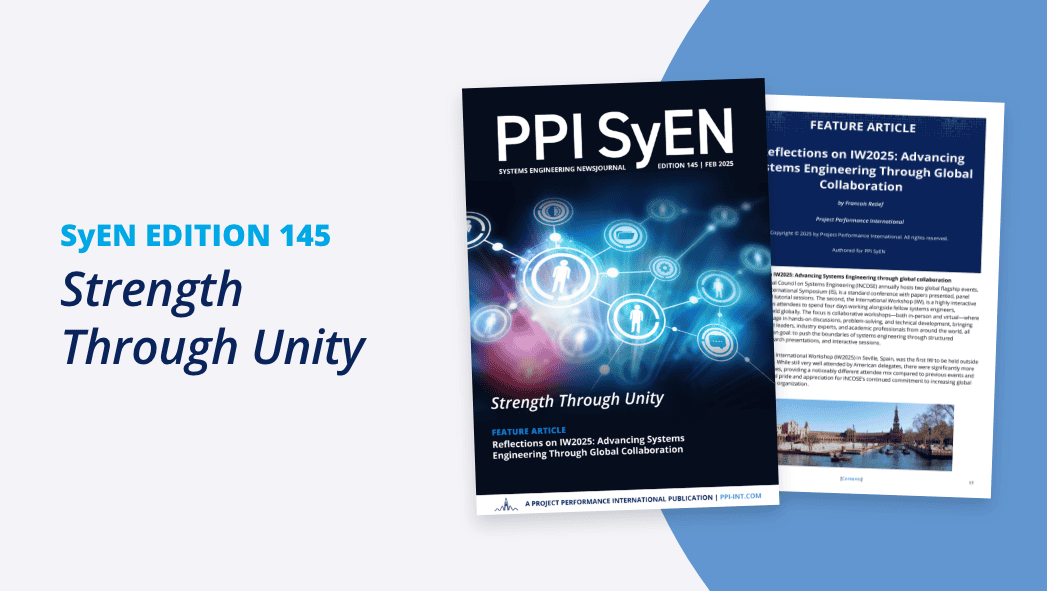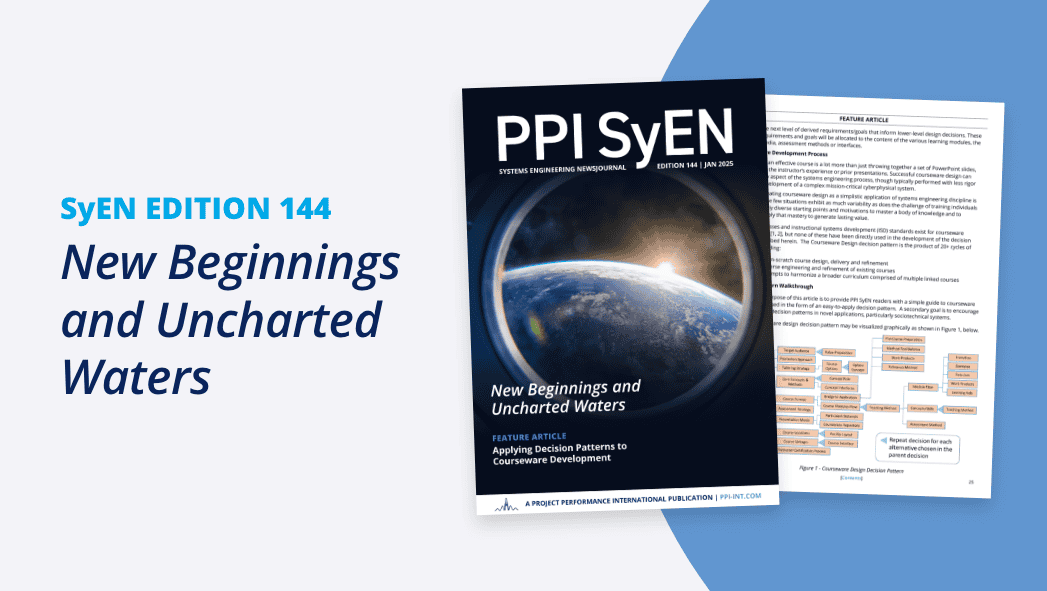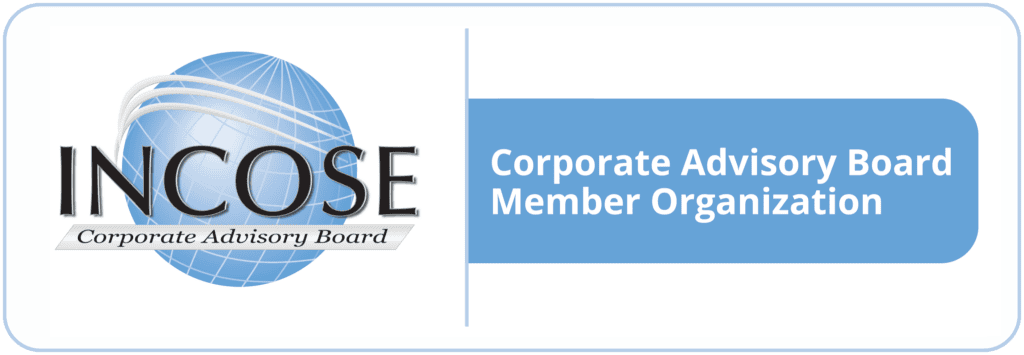WHAT’S INSIDE:
A Quotation to Open On
Feature Article: Body of Knowledge and Curriculum to Advance Systems Engineering (BKCASE)
Systems Engineering News
- Upcoming Submission Deadlines and Themes for INSIGHT
- INCOSE Event Calendar
- Call for Papers for Theme Issues of Software and Systems Modeling
- Reliability and Maintainability Symposium Systems Engineering Panel
- Second Exam Level in Program to Certify Practitioners of Model-Based Systems Engineering Using SysML
- Comprehensive and Robust Requirements Engineering and Management Framework
- DoD Scales Back Conflict-of-interest Rules
Featured Societies – TBD
INCOSE Technical Operations – Space Systems Working Group
Systems Engineering Software Tools News
- No Magic Releases Cameo Simulation Toolkit
Systems Engineering Books, Reports, Articles and Papers
- Architecting Resilient Systems
- 10 Favorite Systems Thinking Books of the Past 10 Years (Or So)
Conferences and Meetings
Education and Academia
- UCL Centre for Systems Engineering
- Postdoc Research Fellow Positions on System Analysis and Model Checking – Singapore University of Technology and Design
Some Systems Engineering-Relevant Websites
Standards and Guides
- ISO Technical Committees related to Systems Engineering
- ISO/IEC JTC 1 SC 7 – Software and System Engineering
A Definition to Close on
PPI News
A Quotation to Open On
TBD
Feature Article
Body of Knowledge and Curriculum to Advance Systems Engineering (BKCASE)
By Alwyn Smit (asmit@csir.co.za)
Background
In May 2007 the Integrated Systems and Software Engineering Curriculum (iSSEc) program begun at Stevens Institute of Technology, sponsored by the US DoD Director of Systems and Software. The project aimed to deliver three products, namely:
- A modern reference curriculum for a master’s degree in software engineering that integrates an appropriate amount of systems engineering (GSwE2009)
- A modern reference curriculum for a master’s degree in systems engineering that integrates an appropriate amount of software engineering (GRCSE)
- A truly interdisciplinary degree that is neither systems not software engineering – it is both
Both Phase 1 and 2 conducted surveys to determine the current state of master’s level education in their respective fields and both surveys showed the same general pattern in SwE and SE to be:
- Lack of consistency, structure and requirements in degree programs
- Several different types of degrees offered
- Lack of consistency in entrance expectations
What is BKCASE?
The Body of Knowledge and Curriculum to Advance Systems Engineering (BKCASE) project is the second phase of the iSSEc program and the December 2009 issue of INSIGHT [2] reported it was started in September 2009 by Stevens Institute of Technology, together with the Naval Postgraduate School. The project is a three-year effort to create:
- A robust Systems Engineering Body of Knowledge (SE BoK)
- A Graduate Reference Curriculum in System Engineering (GRCSE, pronounced “Gracie”)
Endorsed by the INCOSE Board of Directors, with significant funding from the U.S. Department of Defense and support from the IEEE Systems Council, BKCASE is the response to a call from government and industry for a globally recognized, community-created foundation for the discipline of systems engineering. The BKCASE project hopes to materially influence standard practice, workforce models, certification, and graduate education around the world.
The BKCASE team includes invited authors and volunteer reviewers from around the world representing different locales, business segments, professional societies, and areas of expertise. The team has representation from government, industry and academia.
Two interim drafts and the final products were planned to be developed in one-year intervals starting in June (SE BoK) and September (GRCSE) of 2010, with version 1.0 products due out in 2012.
The BKCASE Project Charter
The BKCASE project charter is contained on the BKCASE website at http://www.bkcase.org/about-bkcase/project-charter/. The vision is defined as:
“Systems Engineering competency models, certification programs, textbooks, graduate programs, and related workforce development initiatives around the world align with BKCASE.”
Besides the creation of the SEBoK and GRCSE products, the mission state the intent to facilitate the global alignment of related workforce development initiatives with SEBoK and GRCSE and the ultimate transfer of stewardship of SEBoK and GRCSE to INCOSE and the IEEE after BKCASE releases version 1.0 of those products. Possible integration into their certification, accreditation, and other workforce development and education initiatives is also envisaged.
What is the SEBoK?
The SEBoK was defined by Pyster and Olwell at the October 2010 NDIA Conference [5] as describing the boundaries, terminology, content and structure of SE that are needed to systematically and consistently support and enable:
- Informing Practice
- Informing Research
- Defining Curricula
- Certifying Professionals
- Deciding Competencies
It is a guide to the literature, not all the content of the literature.
The SEBoK value proposition is defined in a presentation given by Art Pyster to the Finger Lakes Chapter of INCOSE in January 2010 [4].
What is in GRCSE?
The content of GRCSE was also defined by Pyster and Olwell at the October 2010 NDIA SE Conference [5] as:
- Guidance for constructing and maintaining the reference curriculum
- Entrance expectations
- Objectives
- Outcomes
- Architecture
- Core Body of Knowledge
GRCSE does not contain specific courses or specific packaging, but adaption and selective adoption is expected and encouraged.
The GRCSE value proposition is also defined in the presentation given by Art Pyster to the Finger Lakes Chapter of INCOSE in January 2010 [4].
The BKCASE Story
In a presentation made by Adcock, Lawson, Olwell, Pyster and Roussel at the EUSEC 2010 Academic Forum [3], the BKCASE project with all its interactions is depicted in the following systems diagram by Alice Squires. This diagram is in fact the culmination of the development of the “BKCASE Story” in both video and MS PowerPoint formats that can be found on the BKCASE website at http://www.bkcase.org/about-bkcase/bkcase-story/. The development of the systemigrams is also addressed in a paper by Squires, Pyster, Sauser, Olwell and Gelosh at the IS2010 [7].
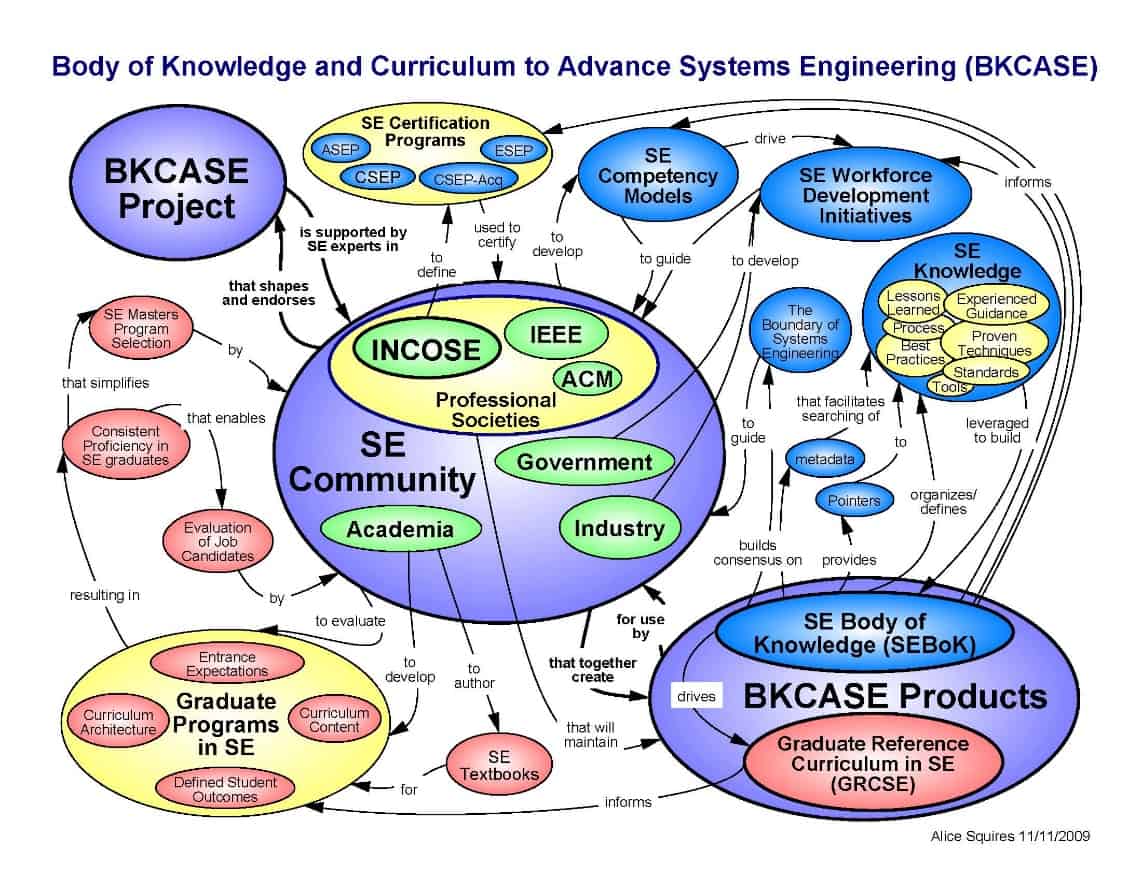
Pyster and Olwell concluded their presentation at the October 2010 NDIA SE Conference [5] by stating that:
“If the BKCASE project turns out to be successful, it is envisaged that:
- The SEBoK will strongly influence the INCOSE SE Handbook Version 4, the INCOSE SE Professional Certification Program, UD DoD SE competency efforts, will highlight places where research is needed, become a standard reference for practitioners, and improve the quality and richness of communication among systems engineers worldwide.
- GRCSE will clearly distinguish between graduate and undergraduate education in SE and influence the content of both undergraduate and graduate SE programs worldwide.”
Versions 0.25 of the SEBoK and GRCSE have both been released by Dec 2010 for limited review. These products have been the topic of some heated discussions in the INCOSE environment and to me that indicates the level of interest and passion that surrounds the topic of SE education. This significant effort to unify and set a baseline for SE education is sure to elicit a lot more discussion before and after reaching public availability.
References:
- N. Hutchison, M. Towhidnejad, G. Travassos, J. Brackett, R. Adcock, GRCSE and GSwE2009: Educational Advancements to Support Government and Industry, NDIA SE Conference, San Diego, California, Oct 2010, http://www.bkcase.org/fileadmin/bkcase/files/publications_and_briefs/NDIA_GSwE2009GRCSE_27Oct10_final.pdf
- INCOSE INSIGHT, December 2009 – Volume 12 Issue 4, https://connect.incose.org/INSIGHT%20Library/vol-12-issue-4.pdf
- Rick Adcock, Bud Lawson, Dave Olwell, Art Pyster, Jean Claude Roussel, BKCASE: Body of Knowledge and Curriculum to Advance Systems Engineering, Panel Discussion, 2010 EUSEC Academic Forum, Stockholm, http://www.bkcase.org/fileadmin/bkcase/files/publications_and_briefs/2010_EUSEC_Panel_on_BKCASE.ppt
- Art Pyster, Global Workforce Development Initiatives in Systems and Software Engineering: BKCASE and GSwE2009, Presented to the Finger Lakes Chapter of INCOSE, 21 January 2010, http://www.bkcase.org/fileadmin/bkcase/files/publications_and_briefs/100121_BKCASE_and_GSwE2009_INCOSE_21Jan10.pdf
- Art Pyster, Dave Olwell, The Body of Knowledge and Curriculum to Advance Systems Engineering Project, NDIA SE Conference, San Diego, California, Oct 2010, http://www.bkcase.org/fileadmin/bkcase/files/publications_and_briefs/NDIA_SE_Conference_October_2010.pdf
- The BKCASE website, www.BKCASE.org
- Alice Squires, Art Pyster, Brian Sauser, David Olwell, Don Gelosh, Applying Systems Thinking via SystemigramsTM for Defining the Body of Knowledge and Curriculum to Advance Systems Engineering (BKCASE) Project, IS 2010, Chicago, Illinois, http://www.bkcase.org/fileadmin/bkcase/files/publications_and_briefs/2010INCOSESystemigramsBKCASESquires.pdf.
About Alwyn Smit
Alwyn is a systems engineer with the Council for Scientific and Industrial Research in South Africa. His career of 27 years includes more than 20 years in project management and systems engineering on defence related projects. He is a long standing member of INCOSE and a Certified Systems Engineering Professional. He is also a past president of the INCOSE SA Chapter and the editor of SyEN.
Systems Engineering News
Upcoming Submission Deadlines and Themes for INSIGHT
INSIGHT is the newsletter of International Council on Systems Engineering. It is published four times per year (January, April, July, October). INSIGHT features status and information about INCOSE’s technical work, local chapters, and committees and boards. Additionally, related events, editorials, book reviews, trends, and how-to-do articles that are pertinent to the many aspects of a systems engineer’s job are also included, as space permits.
Upcoming submission deadlines and themes for INSIGHT
INCOSE Event Calendar
| International Workshop 2011 (IW 2011) | Jan 29 – Feb 01, 2011 |
| Sixth International Conference on Systems Engineering sponsored by INCOSE-IL/ILTAM | Mar 08 – 09, 2011 |
| CSER2011 – Ninth Annual Conference on Systems Engineering Research | Apr 14 – 16, 2011 |
| SETE2011 The Systems Engineering Test and Evaluation Conference | May 02 – 04, 2011 |
| 21st Annual International Symposium | Jun 20 – 23, 2011 |
| Second International Conference on Complex Systems Design and Management (CSDM 2011 | Dec 07 – 09, 2011 |
Call for Papers for Theme Issues of Software and Systems Modeling
Theme Issue: Software and Systems Modeling with Graph Transformations
organized by Andy Schürr and Arend Rensink
(submission deadline: 03.04.2011)
Theme Issue: Models and Evolution
organized by Dalila Tamzalit, Dirk Derider, Bernhard Schätz, and Alfonso Pierantonio
(deadlines: intent to submit 10.01.2011; submission 15.03.2011)
Reliability and Maintainability Symposium Systems Engineering Panel
Reliability and Maintainability Symposium, RAMS©, will present a powerful Systems Engineering Panel at the January 24-27 th, 2011 conference at Disney’s Contemporary Resort, Lake Buena Vista, Florida.
Second Exam Level in Program to Certify Practitioners of Model-Based Systems Engineering Using SysML
OMG® announced that “Model Builder-Fundamental,” the second examination in the OMG Certified Systems Modeling Professional™ (OCSMP™) program, is now available. The program’s sponsors IBM®, Lockheed Martin, Sparx Systems and No Magic, Inc., and OMG certification partner UML Technology Institute Co., Ltd. (UTI), have made construction and validation of the exams possible. For more information, please visit http://www.omg.org/ocsmp.
Comprehensive and Robust Requirements Engineering and Management Framework
Authored and designed by its Director Vijay S Shukla QBI Institute (http://www.qbi.in) has released a comprehensive and robust Requirements Engineering and Management Framework for the benefit of organizations and individuals including Requirement Engineers, Business Analysts, IT Business Analysts, Software Testers, Project Managers etc.
DoD Scales Back Conflict-of-interest Rules
The US Defense Department is scaling back a tough, new conflict-of-interest rule for some contracts, including those for IT and professional services.
According to a final rule, published in the Federal Register, only major weapons systems contracts and systems engineering and technical assistance will be subject to stricter standards.
Featured Society – TBD
More information
INCOSE Technical Operations
Space Systems Working Group
http://www.incose.org/practice/techactivities/wg/sswg/
Charter
The Space Systems Working Group (SSWG) is an association of INCOSE members worldwide who are engaged in the practice of systems engineering in the space arena in government, academic and private industry organizations.
Leadership
Chair:
Steven Jenkins, Jet Propulsion Laboratory
Co-Chair:
Stephen Piggott, Canadian Space Agency
Comunications Coordinator:
Marc Sarrel, Jet Propulsion Laboratory
Presentations
![]() Overview of SSWG – July 2006 Size: 400K
Overview of SSWG – July 2006 Size: 400K
![]() 2008 International Workshop Space Systems Summary Presentation Size: 200K
2008 International Workshop Space Systems Summary Presentation Size: 200K
Contact Space Systems Working Group for additional information or to join this group.
Background
At the INCOSE Workshop, held in Scottsdale, Arizona, in January 2000, an interest group was formed devoted to demonstrating the activities of systems engineering in the space industry, recognizing that many of the INCOSE members had careers in the space industry. This led to the initial creation of the Space Systems Interest Group on January 27, 2000.
The Charter for the INCOSE Space Systems Working Group (SSWG) was developed on April 28, 2000. The SSWG was voted by the Systems Engineering Applications Technical Committee (SEATC) Chairmen to be elevated from an Interest Group to a Working Group based on completion of the necessary elements cited in the Systems Engineering Organization Report. This vote was taken in a telcon on May 9. 2000.
Purpose
The purpose of the SSWG is to expand the body of knowledge of systems engineering as it is applied to space systems. Specifically, the purpose of the SSWG is to:
- Promote the use of systems engineering principles, techniques, and practices in a wide range of activities in the government, academic and private industry organizations which are identified with space applications;
- Share best practices in the international space arena;
- Link systems engineering organizations across international boundaries; and
- Promote the systems engineering principles within the member’s home organizations.
Objectives
The chief means by which the SSWG accomplishes its purpose is through development and sponsoring of activities within the INCOSE during its symposia, workshops and its local chapters. The objectives include, but are not limited to, improving the people, processes, and resources used in the systems engineering mission as follows:
People
- Enunciating career opportunities for systems engineering in the space domain
- Recruiting qualified space systems engineers to membership
- Sponsoring professional programs at INCOSE meetings to exchange systems engineering techniques and practices used in the space domain
- Maintaining a forum within INCOSE to address space technology and applications issues
- Developing informational outreach programs to promote the successful application of the systems engineering approach within the space industry
- Representing INCOSE and the SSWG with other professional societies
Processes
- Developing analogies within the space community which might transfer to commercial and public interest applications
- Improving the systems engineering process within the space applications
- Reviewing and promulgating professional standards for the practice of systems engineering in space applications
- Maintaining a forum to exchange the successful practices and processes used in space applications
- Developing architectures for space exploration
Resources
- Maintaining a list of resources useful to systems engineers practicing in the space applications domain
- Identifying automated tools and their capabilities
- Facilitating interaction with other groups
Description
The application of systems engineering to the specific space subdomains offers challenging opportunities for discourse between other professions and the expansion of systems engineering within the space industry. Commercial and public interest applications have much to offer the traditional practices of systems engineering in the space industry, and systems engineering utilized in the space industry can be applied to a wide range of commercial and public interest applications with significant benefit.
Structure and Operation
The SSWG is composed of members of INCOSE who have interest in one or more of the systems engineering space subdomains cited previously. The policies and activities of the SSWG are governed by a board elected by the SSWG members at an annual symposium of INCOSE. Local working groups are elected or appointed from their local chapters. SSWG board consists of the following members:
- Chairperson, elected by the membership of the working group at the INCOSE annual symposium for a two-year term (The intent is to rotate the chair position among the international members)
- Deputy chair elected by the membership of the working group for a two-year term
- Secretary, selected by the chairperson for a two-year term
The responsibilities of the SSWG chairperson are as follows:
- Direct SSWG meetings
- Coordinate logistics for such meetings
- Ensure meeting minutes, agendas, and newsletters are prepared and distributed
- Establish the annual goals for the SSWG
- Prepare committee reports as required
- Interface with the INCOSE Technical Leadership Team (TLT) and other working groups
- Support coordination of the SSWG activities
The responsibilities of the SSWG deputy chair and secretary are assigned by the chairperson.
Membership
Persons who would like to participate in the INCOSE Space Systems Working Group should contact either the chairman or deputy chairman as listed on the INCOSE website.
Working Group Goals
The elected chairperson will set two-year goals for the working group. These goals will be set at the annual symposium and reflected in Appendix A of this document. The candidates for chair and deputy chair will submit their proposed goals at the annual symposium. These goals will be discussed and confirmed by the membership at the annual symposium. The goals of the SSWG are to:
- Contribute each year to the INCOSE annual international symposium
- Review papers for the annual symposium.
- Submit papers for the annual symposium.
- Establish a space systems session and/or panel for the annual symposium.
- contribute to IPAL in the area of space systems
- Contribute to the INSIGHT magazine
- Create individual article(s) for an INSIGHT issue
- Dedicate a complete issue of INSIGHT to space systems.
- Invite members to speak on how systems engineering is being performed in space systems applications within government, academia and private industry.
- Conduct outreach to academia in the area of space systems. Establish liaisons for student affairs at the universities.
- Generate white papers on important issues in systems engineering in the space domain.
- Serve as liaison to other space related organizations (e.g. AIAA, IEEE, AAS, etc.).
Published Products
- MBSE Grand Challenge Interim Report
- MIT Graduate Class physics based model
- Initial SSWG SysML based object oriented model
- IS’08 Panel Proposal
- Bibliography of Crosslink magazine articles on SE
Planned Work
- MBSE Grand Challenge
- linking of models; added fidelity; development of state analysis SEM
- December ‘08 Insight Issue
- Gap Analysis – joint project w/Lean SEWG
Systems Engineering Software Tools News
No Magic Releases Cameo Simulation Toolkit
No Magic, Inc., claiming to be the leading global provider of integrated modeling, simulation & analysis solutions and services, announced the release of Cameo Simulation Toolkit, a ground-breaking extension to its award-winning modeling solution, MagicDraw. The Cameo Simulation Toolkit is the first in the industry to provide an extendable model execution framework based on Foundational Subset for Executable UML® Models (fUML) and State Chart XML (SCXML) standards.
Systems Engineering Books, Reports, Articles and Papers
Architecting Resilient Systems
The following two articles by Scott Jackson were published in the IIE Western Region News during December 2010:
Architecting Resilient Systems: Part 1 Accident Avoidance and Survival and Recovery from Disruptions – More information
Architecting Resilient Systems: Part 2 Accident Avoidance and Survival and Recovery from Disruptions – More information
10 Favorite Systems Thinking Books of the Past 10 Years (Or So)
by Janice Molloy
According to most sources, our current decade began on January 1, 2010, so I’m about a year late in compiling a list of my favorite systems thinking books of the 00s. But I’ve received so many requests lately for my systems thinking “must reads” that I’ve decided to run the risk of being hopelessly late to the party and share my top titles of the past 10 years (or so).
This list is admittedly U.S.-centric; please use the “Comments” section to recommend books published in other countries and from different perspectives on systems thinking. Another mea culpa is that I haven’t included anything by Russell Ackoff. I hope you will weigh in with your suggestions on which of his books would make your top 10 greatest hits from the past decade.
Conferences and Meetings
isee systems – Introduction to Dynamic Modeling with STELLA and iThink
January 19-21, 2011, The Westin Gaslamp Quarter, San Diego, CA
ICECSE 2011 “International Conference on Electrical, Computer and Systems Engineering”
January 25-27, 2011, Dubai, United Arab Emirates
RAMS – Reliability and Maintainability Symposium ![]()
January 24-27, 2011, Disney’s Contemporary Resort in Lake Buena Vista, FL, USA
INCOSE International Workshop 2011 (IW 2011)
January 29 – February 01, 2011, Hyatt Regency Phoenix, Phoenix, AZ, USA
2011 Safety-critical Systems Symposium (SSS’11)
February 8-10, 2011, De Vere Grand Harbour Hotel, Southampton
Workshop on Challenges and Opportunities for Lifeline Systems Engineering ![]()
February 9, 2011, San Diego, California
Second International Conference on Exploring Services Sciences (IESS 1.1)
February 16-17-18, 2011, Geneva, Switzerland
The Sixth International Conference on Systems Engineering in Israel
March 8-9 2011, Herzlia, Israel
2011 International Conference on Systems Engineering and Modeling (ICSEM 2011)
March 11 to 13, 2011, Shanghai, Shanghai, China
Second ACM/SPEC International Conference on Performance Engineering
(ICPE 2011)
March 14-16, 2011 Karlsruhe, Germany
Design, Automation & Test in Europe
March 14-18, 2011, Grenoble, France
26th Symposium On Applied Computing
March 21 – 25, 2011, Tunghai University, TaiChung, Taiwan
Requirements Engineering Track – 4th Edition
Part of the 26th ACM Symposium on Applied Computing
March 21 – 25, 2011, Tunghai University, TaiChung, Taiwan
ICST Workshop on Requirements and Validation, Verification & Testing (ReVVerT 2011)
Co-located with the 4th International Conference on Software Testing, Verification and Validation (ICST 2011)
March 21-25, 2011 (one day), Berlin, Germany
1st Int’l Workshop on Variability-intensive Systems Testing, Validation & Verification
Co-located with ICST 2011
March 21, 2011, Berlin, Germany
7th Workshop on Advances in Model Based Testing (A-MOST 2011)
Co-located with the 4th International Conference on Software Testing, Verification and Validation (ICST 2011)
March 21, 2011 – Berlin, Germany
Scenario-Based Testing – SCENARIOS 2011 ![]()
Co-located with the 4th International Conference on Software Testing, Verification and Validation (ICST 2011)
March 21, 2011, Berlin, Germany
IWEI 2011 – The International Working Conference on Enterprise Interoperability
March 22-24, 2011, Stockholm, Sweden
MoBE-RTES 2011 – 2nd IEEE Workshop on Model-based Engineering for Real-Time Embedded Systems
March 28th, 2011, Newport Beach, California
REFSQ 2011 – 17th International Working Conference on Requirements Engineering: Foundation for Software Quality
March 28-30, 2011, Essen, Germany
EPICAL – Workshop on Empirical Research in Requirements Engineering: Challenges and Solutions ![]()
March 31, 2011, Essen, Germany
MBT 2011 – Seventh Workshop on Model-Based Testing
April 2-3, 2011, Saarbrϋken, Germany
Satellite workshop of ETAPS 2011
GT-VMT 2011 – International Workshop on Graph Transformation and Visual Modeling Techniques
April 2-3, 2011, Saarbrücken, Germany
IEEE International Systems Conference
April 4-7, 2011, Montreal, Quebec, Canada
Symposium on Theory of Modeling and Simulation (DEVS/TMS’11)
April 4-9 2011, Boston, MA, USA
1st International Workshop on Model-driven Approaches for Simulation Engineering
Held under the aegis of the Symposium on Theory of Modeling and Simulation, part of the SCS SpringSim 2011 conference.
April 4-9, 2011, Boston, MA (USA)
International Symposium on Ambient Intelligence
April 6-8, 2011, University of Salamanca, Salamanca, Spain
Workshop on the Reliability of Intelligent Environments (WORIE ’11)
within the International Symposium on Ambient Intelligence
April 6-10, 2011, University of Salamanca, Salamanca, Spain
CSER 2011 – Conference on Systems Engineering Research
April 14-16 2011, Redondo Beach Crown Plaza, Redondo Beach, CA, USA
Systems Engineering & Architecting Doctoral Student Network (SEANET) workshop ![]()
In conjunction with the 9th Conference on Systems Engineering Research
April 14, 2011, University of Southern California, CA, USA
More information to follow
17th International Conference on Information and Software Technologies
April 27th – 29th, 2011, Kaunas, Lithuania
SETE 2011 – Systems Engineering and T&E ![]()
May 2-4, 2011, Rydges Lakeside, Canberra, Australia
Software & Systems Engineering Essentials![]()
May 9-10, 2011, Frankfurt, Germany
Risk-Based Approaches to Major Decisions (Risk ’11)
May 13 – 14, 2011, Falmouth, Cornwall, United Kingdom
International Conference on Software and Systems Process (ICSSP 2011)
(co-located with ICSE 2011)
May 21-22, 2011, Waikiki, Honolulu, Hawaii, USA
Sixth Workshop on SHAring and Reusing architectural Knowledge (SHARK 2011)
(co-located with 33rd Int. Conf. on Software Engineering (ICSE 2011))
May 21-28, 2011, Waikiki, Honolulu, Hawaii, USA
RSP 2011 – IEEE International Symposium on Rapid System Prototyping
May 24 – 27, 2011, Karlsruhe Institute of Technology (KIT), Karlsruhe, Germany
SPICE 2011 – The 11th International SPICE Conference Process Improvement and Capability dEtermination
30 May – 1 June 2011, Dublin, Ireland
Seventh European Conference on Modelling Foundations and Applications
6-9th of June, 2011, University of Birmingham, Birmingham, UK
TTCN‑3 – 10th Testing & Test Control Notation User Conference
June 7-9, 2011, Bled, Slovenia
4th Symposium on Resilience Engineering
June 8-10, 2011, Sophia Antipolis, France
ONTOSE 2011 – 5th International Workshop on Ontology, Models, Conceptualization and Epistemology in Social, Artificial and Natural Systems ![]()
June 20, 2011, University of East London – Docklands Campus, London, UK
BPMDS’11 Working Conference
in conjunction with CAISE 2011
June 20-21 in London, United Kingdom
Swiss Requirements Day ![]()
June 22, 2011, Kongresshaus, Zurich
FM 2011: 17th International Symposium on Formal Methods
June 20 – 24, 2011, Lero, Limerick, Ireland
The 32nd International Conference on Application and Theory of Petri Nets and Concurrency (PETRI NETS 2011)
11th International Conference on Application of Concurrency to System Design (ACSD 2011)
June 20-24, 2011 Kanazawa Cultural Hall, Kanazawa, Japan
INES 2011 – 15th IEEE International Conference on Intelligent Engineering Systems 2011
June 23-25, 2011, Poprad, High Tatras, Slovakia
SoSE 2011 – 2011 6th International Conference on System of Systems Engineering (SoSE)
Jun 27 – 30, 2011, Albuquerque, New Mexico, U.S.A
ICMT2011 – International Conference on Model Transformation
Theory and Practice of Model Transformations
Co-located with TOOLS Europe 2011
June 27 – July 01, 2011 – Zurich, Switzerland
15th International Conference on System Design Languages
July 5th – 7th, 2011, Toulouse, France
International System Dynamics Conference
July 24 – 28, 2011, Washington, DC, USA
46th Annual International Logistics Conference and Exhibition (SOLE 2011)
August 2011
19th IEEE International Requirements Engineering Conference
August 29 – September 2, 2011, Trento, Italy
International Conference on Industrial Engineering, Systems Engineering and Engineering Management for Sustainable Global Development
September 21-23, 2011, Spier Hotel and Conference Centre, Western Cape, South Africa
Second Annual IIBA Conference
October 2011, More details TBA
AGTIVE 2011 – International Symposium on Applications of Graph Transformation with Industrial Relevance ![]()
October 4‑7, 2011, Budapest, Hungary
SSEE 2011 – Society for Sustainability and Environmental Engineering 2011 International Conference
October 24-26, 2011, Brisbane Convention & Exhibition Centre, Brisbane, Australia
Education and Academia
UCL Centre for Systems Engineering
The University College London (UCL) Centre for Systems Engineering is a centre of excellence for Systems Engineering and the Management of Technology Projects.
It is their philosophy that the realisation of large, complex projects is a combination of good systems engineering practice, strategic planning, project management and systems thinking. In their courses they instill this multi-level, long term view of systems development so that the organisation undertaking such developments can be pro-active in dealing with the dynamics of the modern business environment.
Postdoc Research Fellow Positions on System Analysis and Model Checking – Singapore University of Technology and Design
Highly motivated applicants are being sought to work on developing model checking techniques or applying model checking techniques to real-world problems. The postdoc will work with department of Information System Technology and Design, Singapore University of Technology and Design and collaborate with the software engineering team at National University of Singapore.
Some Systems Engineering-Relevant Websites
BKCASE (pronounced “Bookcase”) is the acronym for the Body of Knowledge and Curriculum to Advance Systems Engineering. The BKCASE project is led by a university partnership between the Stevens Institute of Technology and the Naval Postgraduate School. This site is intended to provide the public with information pertaining to the BKCASE mission and to serve as a project support tool for all BKCASE participants and advocates from around the world.
Standards and Guides
ISO Technical Committees related to Systems Engineering
When viewing the list of ISO Technical Committees, it is clear that there are a host that has some relation to Systems Engineering. Some of these that are more directly related include:
- ISO/IEC JTC 1 SC 7 – Software and System Engineering
- ISO/IEC JTC 1/SC 35 – User interfaces
- ISO TC 159 – Ergonomics
- ISO TC 176 – Quality management and quality assurance
- ISO TC 184 – Automation systems and integration
- ISO TC 236 – Project Committee: Project Management
- ISO TMB/WG SR Technical Management Board/Risk management (ISO 31000)
We will be taking a closer look at each of them in the near future.
ISO/IEC JTC 1 SC 7 – Software and System Engineering
The JTC1 SC 7 website lists a host of information on this sub-committee. It includes a list of 16 working groups.
The SC7 Business Plan for the JTC 1 Plenary, Belfast, UK, 2010-11-08 to 13 provides a management summary, a period review and the focus for next work.
The statement of scope, vision, purpose, area of work and core values is included in the management summary. The “Terms of Reference” of SC7 is quoted as “Standardization of processes, supporting tools and supporting technologies for the engineering of software products and systems.”
As part of the period review it provides this nice snapshot of the current collection of SC7 standards:
The work programme for ISO/IEC JTC 1 SC 7 is set out on the ISO website in terms of the standard or project, the Standards Development Process Stage code and the International Classification for Standards (ICS) reference.
A Definition to Close on
TBD
PPI News
TBD
PPI Events (see www.ppi-int.com)
Systems Engineering Public 5-Day Courses (2011)
{Julie to plug in}
Requirements Analysis and Specification Writing Public Courses (2011)
{ Julie to plug in}
Software Engineering Public 5-Day Courses (2011)
{ Julie to plug in}
OCD/CONOPS Public Courses (2011)
{ Julie to plug in}
Cognitive Systems Engineering Courses (2011)
{ Julie to plug in}
PPI Upcoming Participation in Professional Conferences
{ Julie to plug in}
Kind regards from the SyEN team:
Robert Halligan, Managing Editor, email: rhalligan@ppi-int.com
Alwyn Smit, Editor, email: asmit@ppi-int.com
Luke Simpson, Production, email: lsimpson@ppi-int.com
Project Performance International
2 Parkgate Drive, Ringwood, Vic 3004 Australia
Tel: +61 3 9876 7345
Fax: +61 3 9876 2664
Tel Brasil:
Tel UK:
Tel USA:
Web: www.ppi-int.com
Email: contact@ppi-int.com
Copyright 2009 Project Performance (Australia) Pty Ltd, trading as Project Performance International
Tell us what you think of SyEN: email to contact@ppi-int.com
If you do not wish to receive a copy monthly of SyEN in future, please reply to this e-mail with “Remove” in the subject line. All removals are acknowledged; you may wish to contact PPI if acknowledgement is not received within 7 days.
